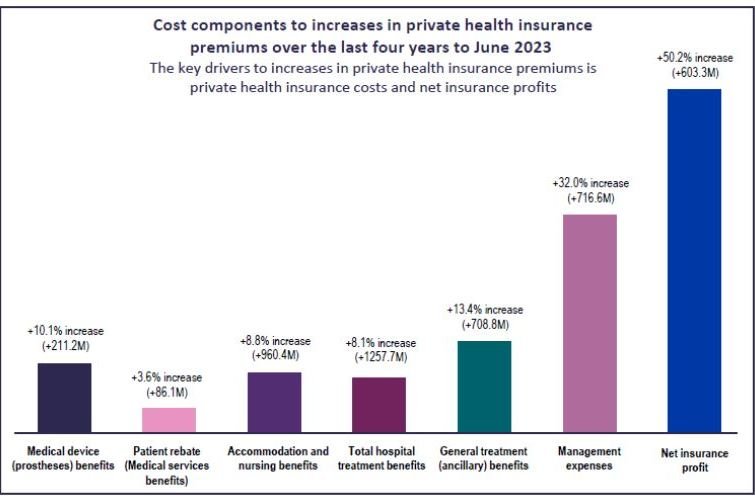Thank you for the opportunity to give evidence and provide this opening statement to the Committee.
The Insurance Council of Australia is the representative body of the general insurance industry in Australia. It does not represent the life insurance or health insurance sectors.
Our 56 member companies represent about 95 per cent of total premium income written by the private sector general insurers. They have more than 125 brands competing in the market.
Our members are essential to the stability of the financial system and the economy. Australian Prudential Regulation Authority statistics show that the general insurance industry generates gross written premium of $50.2 billion a year and has total assets of $129.7 billion.
The industry employs about 60,000 people and on average pays out about $152 million in claims each working day.
The industry is well capitalised at 1.8 times prudential capital requirements and has the backing of major global reinsurers.
I am supported today by Mr John Anning on my left, who heads the Insurance Council’s regulatory and tax policy directorate, and Mr Karl Sullivan on my right, who heads the risk and operations directorate.
I will defer to them on areas of specialist knowledge.
Before I talk to the Royal Commission recommendations, I’d like to provide some context to our evidence.
Natural disasters
Since September, customers have lodged $4.6 billion in insurance claims for damage caused by natural disasters, on top of the normal level of claims that insurers might reasonably expect.
Most of the 242,000 claims are for damage or destruction of family homes, cars and belongings. Thousands of small businesses were also affected.
More than $2.26 billion in claims is from the series of tragic bushfires that predominantly affected New South Wales, Victoria, South Australia and Queensland.
You will remember the terrifying news footage of homes in flames, families seeking safety on beaches and needing evacuation by the navy. You will recall that some communities were virtually wiped out.
Insurers responded immediately. They mobilised recovery teams, and were on the ground as soon as roads reopened to help their customers.
My team and staff from member companies were present in recovery centres, talking to customers, government agencies and relief workers. We also set up insurance hubs in many towns, including Cobargo in NSW.
In one instance the roads to Mallacoota in Victoria were blocked for weeks. We knew locals were concerned about delays to their claims, so we organised an air force flight to the town so that a team of insurance assessors and recovery specialists could inspect the damage.
They borrowed cars from locals, looked at more than 100 homes and businesses, and provided one-on-one guidance to their customers.
The Insurance Council set up a tradies register to help local reputable and qualified builders and tradies seek work from insurers. Almost 1400 businesses registered, employing 4000 skilled workers and 300 apprentices, and were able to bid for repair and rebuilding projects.
Many communities were hit by severe summer hailstorms that damaged thousands of homes and more than 80,000 motor vehicles. I’m sure committee members have seen how bad the damage was in Canberra.
This was the worst natural disaster season on record, and insurers are fulfilling their promise.
They have made – and continue to make – strong progress in helping thousands of families and small businesses.
They are paying claims, rebuilding and repairing properties.
They are pouring millions of dollars into regional economies through the use of local trades and suppliers.
In bushfire zones, insurers have already delivered $1.4 billion in repairs, rebuilds, new contents, cash settlements and financial support.
They are enabling householders get on with their lives.
Today, the Insurance Council has provided a submission to the natural disasters royal commission as well.
We hope it will provide insights into disaster preparation and management, the role of insurance and the impact that state taxation is having on levels of insurance in bushfire communities.
COVID-19
The insurance industry is being disrupted by the COVID-19 pandemic in similar ways to most other businesses.
Insurance is not listed as an excluded business, so insurers can still provide urgent services.
This means tradespeople are able to continue bushfire and hailstorm repairs. And I assure you they are required to take the necessary precautions. The Insurance Council has also ensured that trades are able to cross state borders to perform essential work.
Even during a pandemic, customers lodge claims and need our support, but it is far from business as usual.
Most of the industry is working from home, and centralised call centres have had to be closed. This is affecting response times, claims handling and other services.
Social distancing means other activities – for instance assessments and building works – may be restricted or have ceased. This is often at the request of the customer.
Insurers are pressing ahead despite these challenges. They are focusing on helping customers through these difficult times and are working within the confines of consumer law and the Corporations Act.
They have each developed various packages and support measures to reduce the stress experienced by many Small to Medium Enterprises and household customers and provide immediate relief.
These include deferred premiums, refunds, rebates and a relaxation of claim requirements.
For example, the four largest insurers have announced SME assistance packages that are focused on premium relief and continuity of cover. These companies will be providing evidence at this hearing.
The industry’s Code of Practice also has a strong focus on financial hardship.
So I think you will agree the industry’s customer focus has never been more apparent than in these times of crisis.
Royal Commission recommendations
Insurers have listened to the concerns of customers, governments and consumer groups, and we are responding.
We support the aims of Commissioner Hayne’s recommendations, and I note that he did not find systemic issues with the general insurance industry.
The industry has been working collaboratively with Government to strengthen community trust and confidence in the industry sector, and ensure consumers are treated with dignity and respect.
The Insurance Council is also focused on seeking the right outcomes from the implementation of the Royal Commission recommendations.
The changes must deliver genuine and measurable benefits to customers.
Due to COVID-19 and the worst natural disaster season on record, the industry wrote to the Treasurer seeking a delay to the timeframes for implementation of the Royal Commission legislation to 1 July, 2022.
In this time of immense disruption, the resources of insurers must be focused on helping customers and ensuring claims are handled efficiently and fairly.
We are also concerned that the aggregate effect of all the reforms may result in unintended consequences and uncertain consumer outcomes.
We believe a post-implementation review of the regulatory impact of the legislation is essential. This will make sure customer outcomes have been measurably improved and that there are no unnecessary extra costs and burdens on customers and business.
A review should also look at whether market entry and competition has been reduced.
Conclusion
The Insurance Council’s members are rising to the challenges of natural disasters and the initial impact of COVID-19.
They are helping customers affected by the pandemic through a wide range of assistance packages, including discounts, rebates and refunds.
They are being flexible and adaptive.
I encourage any customer suffering financial hardship at the moment to speak to their insurer.
Insurance is a necessity. It underpins the economy. We need to ensure the industry remains prudentially strong and retains the capacity to take on risk in the community.
This is especially important as Australia recovers from the immense economic and social pain caused by the pandemic and natural disasters.
I and my colleagues are now happy to take any questions from the Committee.








